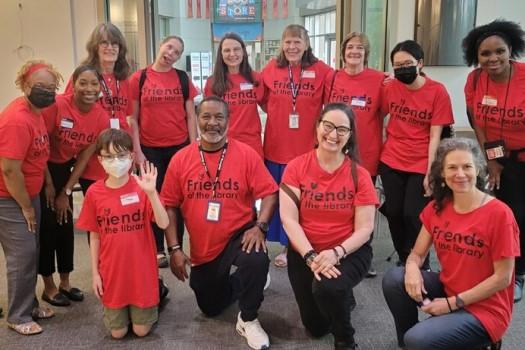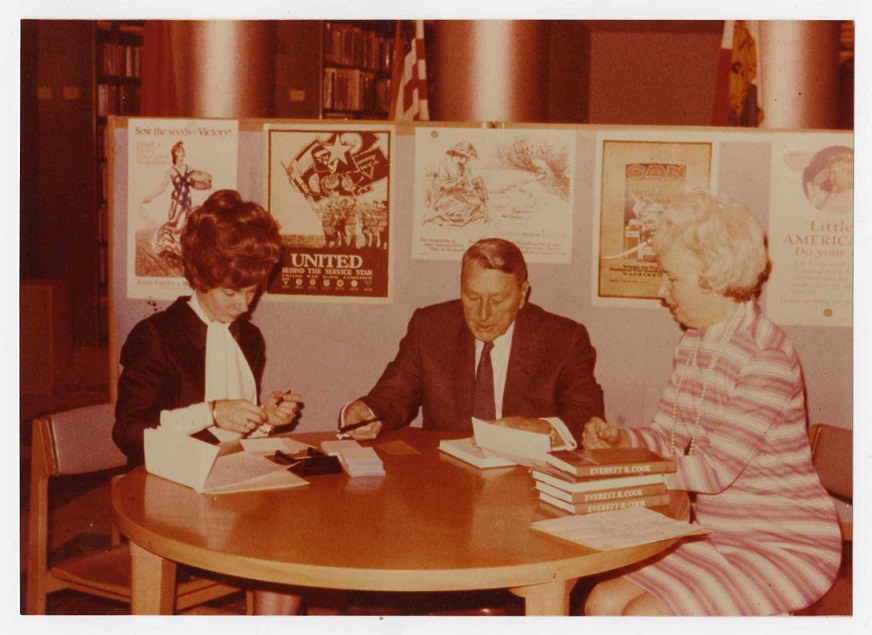ABOUT THE COLLECTION
In 1963, Dr. Joseph Riggs, Professor of Speech and Drama, Memphis State University, conducted an oral history interview with former Governor Gordon Browning, beginning what would later become The Everett R. Cook Oral History Collection.
Most notable among the Dr. Riggs’ subsequent work was Everett R. Cook’s extensive memoir. *See the Cook biography in the section below.* General Cook’s memoir, edited by Dr. Riggs, was published under the title Everett R. Cook: A Memoir and some 1,000 copies were printed. Cook donated the proceeds from the book to establish an oral history program at the Memphis Public Library.
Extensive interviews with such prominent Memphians as Admiral H. M. Martin, Congressman George Grider, Benjamin L. Hooks, Senator Kenneth D. McKellar, and Abe Plough followed. There were also numerous interviews with individuals who represented a broad cross-section of Memphis. An example of the latter was the “Our Folks Have Lore” project, which focused on the life and times of older Memphians, both black and white.
Digitization efforts first began in the 2000s, when Rhodes College partnered with MPL to transfer the interviews from analog tape to digital files hosted online as part of their Crossroads to Freedom Collection.
The first set of interviews made available online in 2009 describe the Vollintine-Evergreen neighborhood and surrounding areas, civil rights work in Memphis, and the Mid-Memphis Improvement Association (MMIA). Interviewees discuss their personal experiences with different civil rights groups, such as the NAACP, as well as working with notable civil rights figures for civil rights advancement in Memphis.
These interviews build upon some of the most interesting material in the Collection – the Neighborhood History Project sponsored by the Metropolitan Inter-Faith Association. Residents of six of the city’s historic neighborhoods, including Rozelle-Annesdale, Cherokee, CooperYoung, Douglass, Buntyn-Messick, and Greenlaw, were interviewed about their communities and their families. Later, the Mid-Memphis Improvement Association conducted interviews with residents of Midtown, and the Vollentine Evergreen Community Association interviewed members of that community.
MPL has continued to collaborate with local academic institutions, and in 2021 partnered with the University of Memphis’ Marcus W. Orr Center for the Humanities to digitize additional material from the Neighborhood History Project.You can hear some of the newly digitized interviews as part of our mini-collections!
Everett R. Cook: A Biograhy
Everett R. Cook’s name is synonymous with Memphis and the cotton industry. Born in Indianapolis December 13, 1894, Cook’s family moved to Memphis when he was a child. His life encompassed a wide range of interests and accomplishments from the founding of his own cotton company before World War I through his military service in World War I, when he served as commander of the 91st Aero Squadron, where he encountered flying aces such as Eddie Rickenbacher and General Billy Mitchell.
In the period between the two wars, Cook fanned E. R. Cook & Company, forerunner of the modem, widely diversified Cook Industries, Inc., a leading international corporation. He was a president of the Memphis Cotton Exchange, vice president of the Commodity Credit Corporation. In 1931, he was a founder of the Cotton Carnival Association, serving as its first president. In 1936, Cook was cofounder and first president of the Cotton Research Foundation, the forerunner of the National Cotton Council.
At the outset of World War II, Cook rejoined the military as a lieutenant colonel and became Deputy Chief of Staff for the 8th and 12th Air Force units under General Carl Spaatz. In his administrative role, Cook had contact with Dwight Eisenhower, Mark Clark, Jimmy Doolittle, and Lauris Norstad, all prominent wartime figures. In 1948, Cook was promoted to the rank of Brigadier General in the Air Force Reserves. His military honors include the Distinguished Service Cross, the Silver Star, the Legion of Merit, the French Legion of Honor and the Croix de Guerre with Palm.
Other public service appointments included Chairman of the Auditorium Commission and election to the Tennessee Constitution Committee in 1953. The Everett R. Cook Convention Center was named in his honor. He held honorary degrees from Southwestern (Rhodes College) and from Christian Brothers College. His death on January 21, 1971, brought expressions of admiration from friends, business associates, and members of state and national government.
*Information from Everett R. Cook Oral History Collection Finding Aid
To begin your exploration into the archive, visit the Collection Homepage to view some of the mini-collections, or click below to browse the entire collection!













